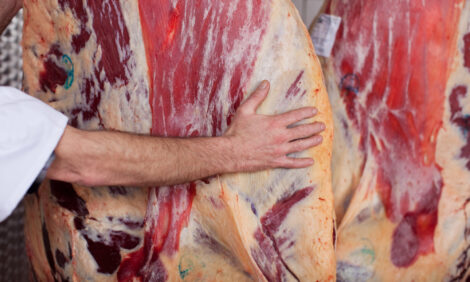



McDonald’s Announces Policy to Eliminate Overuse of Antibiotics in Beef
US - As one of the world’s largest restaurant companies, McDonald’s has the opportunity to use its scale to tackle some of the most complicated challenges facing people, animals and the planet - and help drive industry-wide progress.McDonald’s yesterday announced a policy to reduce the overall use of antibiotics important to human health, as defined by the World Health Organization (WHO), which applies across 85 percent of its global beef supply chain.
According to the WHO, antibiotic resistance is one of the biggest threats to global health, food security, and development today.
With this new policy, McDonald’s is doing its part to help preserve the effectiveness of antibiotics for human and animal health in the future.
Dr Lance B. Price, Director of the Antibiotic Resistance Action Centre at George Washington University, said: "Antibiotic resistance is one of the greatest threats to mankind today.
"We commend McDonald's efforts to develop a global policy guiding how antibiotics are used within its beef supply chain.
"The company has set an ambitious timeline for implementing this policy and it's heartening that it is setting reduction targets that will be transparent and reportedly publicly to its customers.
"It is our hope that the entire beef industry will follow McDonald's leadership and adopt similar policies that reduce and where possible, eliminate antibiotic use, while still allowing veterinarians to treat sick animals."
McDonald's understands that reducing the overall use of medically important antibiotics in beef is complex and cannot be accomplished overnight.
Additionally, there is limited antibiotic usage data available across the global beef industry.
For this reason - in collaboration with our suppliers and beef producers - the company is taking a strategic and phased approach:
- First, McDonald’s is partnering with supplying beef producers in its top 10 beef sourcing markets[1] to measure and understand current usage of antibiotics across a diverse, global supply chain;
- By the end of 2020, based on what the company has learned, it will establish reduction targets for medically important antibiotics for these markets; and
- Starting in 2022, McDonald's will be reporting progress against antibiotic reduction targets across its top ten beef sourcing markets. (Full policy specifics here)
Keith Kenny, Global Vice-president, Sustainability, said: "McDonald's believes antibiotic resistance is a critical public health issue, and we take seriously our unique position to use our scale for good to continue to address this challenge.
"We are excited to partner with our beef supply chain around the world to accelerate the responsible use of whilst continuing to look after the health and welfare of those animals in our supply chain."
McDonald’s has been developing this policy over the past year and a half, while consulting a cross-section of expert stakeholders from veterinarians, to public health leaders, to the beef producers responsible for taking care of the health of animals within the supply chain every day.
Its overall approach to responsible use of antibiotics focuses on refining their selection and administration, reducing their use, and ultimately replacing antibiotics with long-term solutions to prevent diseases and protect animal health and welfare.
With this in mind, McDonald's remains committed to treating animals when needed.
"The path for creating and implementing a global antibiotic use for beef is unprecedented," said Dan Thomson, MS, PhD, DVM from the College of Veterinary Medicine, Kansas State University.
"I've been encouraged by the thoroughness with which McDonald's has engaged diverse experts while creating this policy and the seriousness with which they take this important issue."
This latest announcement builds on fifteen years of progress since McDonald’s first developed a position on responsible antibiotics use in 2003.
In 2016, McDonald’s USA reached its commitment to serve only chicken not treated with antibiotics important to human medicine, nearly one year ahead of schedule.
Further, in 2017, McDonald’s announced an expanded antibiotics policy for chicken in markets around the world, as well as a refreshed Vision for Antimicrobial Stewardship statement with commitments to create responsible-use antibiotic approaches for beef, dairy beef and pork.
Karin Hoelzer, DVM, PhD, Senior Officer at the Pew Charitable Trusts, said: "With the announcement of this new policy, McDonald's again demonstrates its leadership and commitment to responsible antibiotic use.
"The company has laid out a comprehensive and ambitious approach, and Pew looks forward to seeing how McDonald's implements this policy in the months ahead.
"Efforts like this are essential to slowing the emergence of drug-resistant bacteria and preserving the effectiveness of these lifesaving drugs."
Today, McDonald’s is also proud to join the US Centers for Disease Control and Prevention (CDC)’s Antimicrobial Resistance (AMR) Challenge.
Launched in September 2018, the AMR Challenge is a yearlong effort to accelerate the fight against antimicrobial resistance across the globe.
Click here to learn more about McDonald’s commitment, and the more than 130 organizations who have already committed to the challenge.
The company is on a journey to build a better McDonald’s. As it works in partnership with its supply chain and producer partners to address major challenges like antibiotic resistance, McDonald's will continue to listen to customers to make sure it is meeting and exceeding their expectations every day – from the farm to its restaurants.
TheCattleSite News Desk


